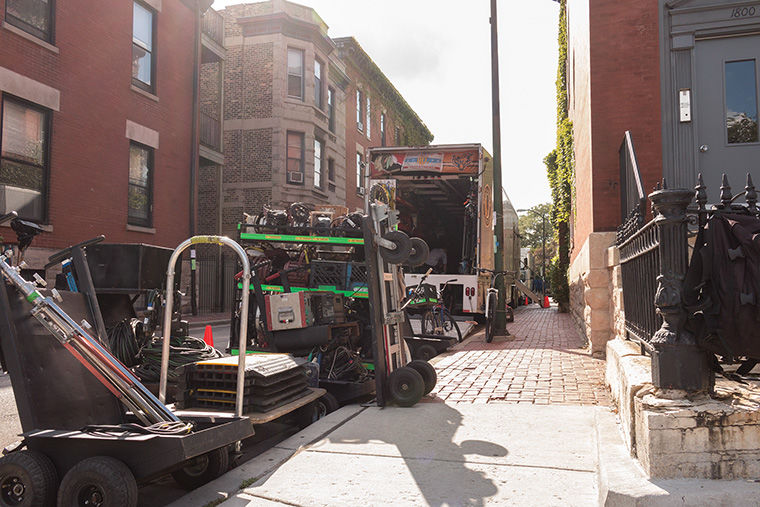Chicago takes spotlight as growing filming destination
Chicago takes spotlight as growing filming destination
September 12, 2016
Chicago will set a record this fall with eight television shows filming full-time in the city.
The uptick in filming projects during the last five years has generated addtional jobs and more than $1.3 billion in city revenue according to an Aug. 31 press release from the mayor’s office.
In the next few months, television shows “Patriot,” “The Exorcist,” “A.P.B.” and “Chicago Justice” are set to join the roster of shows filming in Chicago, which already includes “Empire” and four from producer Dick Wolf: “Chicago Fire,” “Chicago P.D.” and “Chicago Med.”
“We are proud that Chicago continues to serve as a destination for filming and commercial activity… each of these productions contributes significantly to the growth of our neighborhoods and the economic health of our city,” Mayor Rahm Emanuel stated in the press release.
A mayoral spokesperson and Mark Kelly, commissioner of the Department of Cultural Affairs and Special Events, both did not respond to requests for comment as of press time.
The increase during the past five years in Chicago productions is creating greater demand for local industry workers, said Bradley Matthys, president of I.A.T.S.E. Studio Mechanics Local 476, the union that represents a variety of production crafts including set design, makeup and special effects.
“We have to anticipate and prepare for the work we know we’re going to get,” Matthys said.
Matthys pointed out that many of the approximately 1,500 members of the Local 476 are former Columbia students.
One cause of Chicago’s boost in television filming since 2008 is Illinois’ film tax credit, according to Matthys and Eric Scholl, the associate chair of Columbia’s Television Department.
According to the Illinois Film Office, the state offers a 30 percent tax credit to film, television and advertising productions for money spent on Illinois crews and certain goods and services. Producers can receive an additional 15 percent tax credit on the salaries of individuals who live in economically disadvantaged areas of Chicago.
The Illinois Film Office and Chicago Film Office could not be reached for comment as of press time.
“The truth of the matter is: If you don’t have a big tax incentive for filmmaking, you don’t have a film industry, no matter how beautiful the city,” Matthys said.
Both Matthys and Scholl added that the creation of Cinespace, a film studio with 20 sound stages on 1.4 million square-feet on Chicago’s West Side, is another contributing factor for the filming increase.
Mark J. Degnen, the CFO and Manager at Cinespace, said the business’ lots are currently at capacity because of the influx of cable and network shows.
According to Scholl, Chicago’s diverse landscapes also make it an excellent filming destination.
“[Chicago] can be any number of other places,” Scholl said. “Right now Chicago is New York in ‘Empire.’ Chicago can be the ocean; Chicago can be urban not too far out, it can be open lands, [and] individual neighborhoods look like a lot of neighborhoods in other parts of the country.”
Degnen added that television producers admire Chicago’s acting talent pool.
Erica Cruz, a talent agent at Lily’s Talent Agency in Chicago, said that the filming upsurge has been great for her clients who would like to stay in Chicago.
“Usually you have somebody that starts to build a resume and then they go out to one of the coasts,” Cruz said. “We’re able to keep stronger talent around here for longer [now].”
According to Matthys, the increase in business has helped many people in the cinematic arts.
“A lot of families get fed, and a lot of people who love making movies and TV shows get to work in their hometown,” Matthys said.
The most common downside to filming for residents is street closures. However, according to Scholl, the Chicago Film Office schedules filming in locations it will be least disruptive.
Matthys said in the 40 years he has worked in the business, Chicago has never hosted more film and television productions. However, he said he is hoping that a bigger studio will be built for feature films in the future.
“As excited and happy as we are, we want to continue to grow,” Matthys said.
Degnen said he thinks that the upswing will continue.
“The capacity is here,” Dagnen said. “If the tax incentive stays in place, for the foreseeable future [it looks like] Chicago’s a really viable destination for a lot of these productions.”








